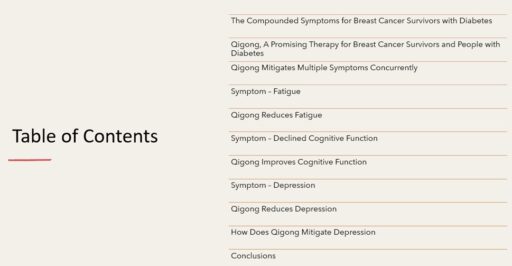Breast cancer survivors face many challenges, and for the 7.8 million survivors worldwide, one-third also live with type 2 diabetes. This combination can lead to heightened symptoms like fatigue, cognitive decline, and depression, as both conditions cause inflammation in the body.
A recently published study done by Indiana University School of Nursing evaluated how Qigong, a traditional Chinese mind-body exercise that includes gentle movements, deep breathing, and meditation, can be a promising approach to tackle the compounded challenges.
(A tutorial with details is available for ATCQA Members and Certified Instructors/Practitioners.)
Studies reveal that breast cancer survivors with diabetes often experience worse symptoms than those without diabetes. This is concerning since both conditions are linked to systemic inflammation, which worsens when combined. This suggests that managing inflammation is key to improving the quality of life for these individuals.
Qigong has shown benefits for both breast cancer survivors and people with diabetes by reducing fatigue, enhancing cognitive function, and alleviating depression.
This recent research supports Qigong’s potential to decrease inflammation and improve blood glucose levels, making it an attractive option for breast cancer survivors with diabetes.
It goes to great lengths to explain how Qigong is able to address each of the symptoms: fatigue, declined cognitive function and depression.
While more studies are needed, Qigong offers a holistic way to manage multiple symptoms simultaneously, potentially improving the lives of those facing the dual challenge of breast cancer and diabetes.
